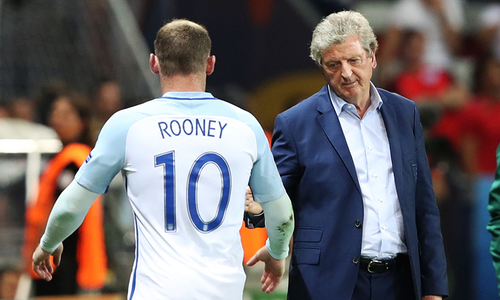LONDON: England's embarrassing exit from the European Championship finals at the hands of outsiders Iceland completed an unwanted treble failure for the country's cricket, rugby union and football teams at international tournaments.
The rugby and cricket teams have rediscovered their mojo under foreign coaches.
Last year, England's cricketers failed to beat a single major nation before a 15-run loss to perennial makeweights Bangladesh in Adelaide sealed the latest in a long of World Cup flops.
England's rugby union team became the first main host nation to be knocked out in the first round of their sport's World Cup.
England, Australia and Wales found themselves in the same 'Pool of Death', with only the top two going into the quarter-finals. Defeats by Wales (28-25) and Australia (33-13) on successive weekends at their Twickenham headquarters saw England knocked out.
In both sports, the response was similar. Two relatively low-profile English coaches in Peter Moores (cricket) and Stuart Lancaster (rugby) were sacked and replaced by Australians with proven international track records in Trevor Bayliss and Eddie Jones respectively.
After England's 2-1 loss to Iceland in Nice on Monday, a defeat that prompted the resignation of manager Roy Hodgson, Twitter was awash with requests for a good Australian football coach.
‘New method’
Encouraged by Bayliss and English assistant Paul Farbrace to pursue a more aggressive approach, the one-day side – still led by captain Eoin Morgan but with just seven survivors from the World Cup – soon found themselves at home to New Zealand, who had hammered them at the global showpiece.
Responding to the bold style of their opponents, the new-look England side won a thrilling series 3-2.
“The learning experience we've had over the last 12 months, with the new group of players, has been so significant that there is almost a completely different team,” said Morgan on Tuesday. “I suppose for us, it was going with a new method and a new group of players.”
In rugby union, the transformation has been even more stark. Jones has now won all nine of his matches as England coach, a sequence that includes a Six Nations grand slam and a 3-0 series win away to his native Australia concluded last week.
But for Jones, that was not good enough.
“We're inconsistent in our defence, we've had two poor games in defence and one very good game and if we want to be the number one team in the world then we need greater consistency in that,” he said.
Whether it is Bayliss encouraging his team to play with more freedom or Jones insisting upon reverting to a traditionally English forward-based power game, both coaches have brought a clarity to their sides' style of play lacking under their predecessors and which many pundits say was missing from Hodgson's men.
Admittedly they have more far more chances to put their methods into practice, given their teams have an annual diet of major international competition that isn't available to the England football manager, with a vast gap in intensity between qualifying and friendly matches compared to tournament play.
Nevertheless, on this point the Australian duo, for all the debate about whether the financially mighty English Premier League, a magnet for overseas players, harms the development of the national football side, may have something to teach football.
German football journalist Raphael Honigstein, writing on the ESPN website, said national teams needed “a clear, continuously implemented system of play, with a coach who picks his players accordingly”.
In the 50 years since England beat West Germany in the 1966 World Cup final at Wembley – the team's last major tournament success – the Germans have won three World Cups and as many European Championships.
The Football Association has said a foreign coach could be named to replace Hodgson.














































Dear visitor, the comments section is undergoing an overhaul and will return soon.